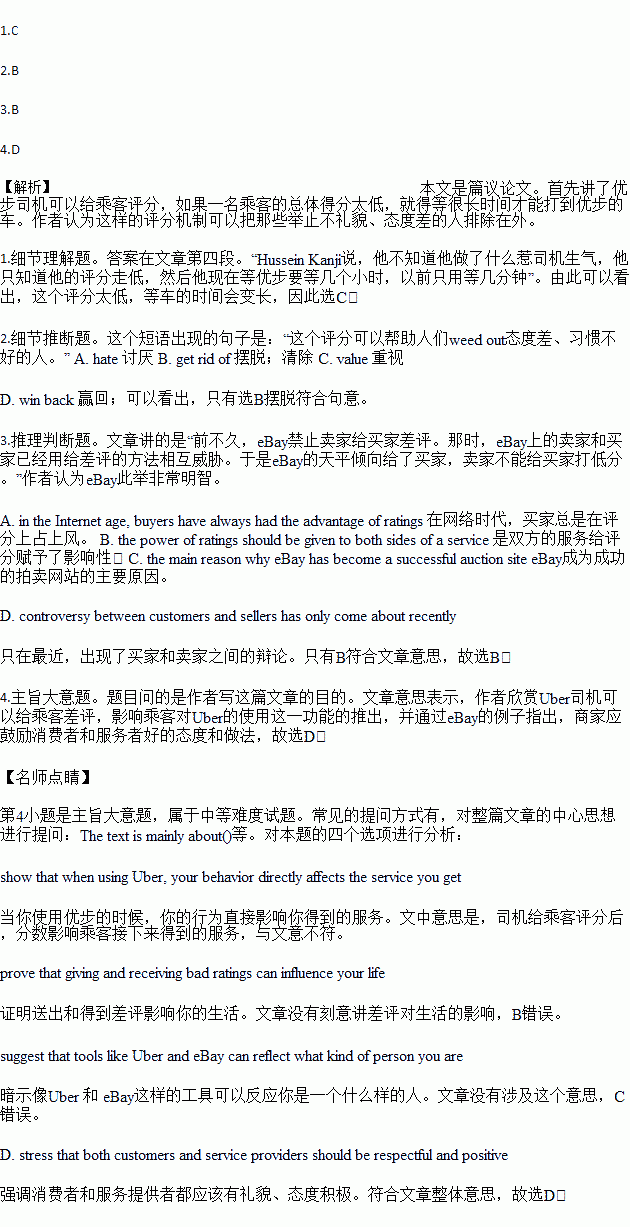题目内容
There are many people you are well advised to treat kindly: Your child’s teacher, your husband or wife, your boss and so on.
Until now, that best-behavior-required list has not included your Uber(优步) driver, or taxi drivers. Old thinking: Hey, they’re here to serve me. I don’t have to make a special effort to be nice to them.
Dangerously wrong.
A recent New York Times story told the educative tale of a Uber passenger, Hussein Kanji, who says he’s really no t sure how he made his driver angry. All he knows is that his driver-generated rating(评分) went way down and the wait for a Uber car became hours instead of minutes.
t sure how he made his driver angry. All he knows is that his driver-generated rating(评分) went way down and the wait for a Uber car became hours instead of minutes.
Be careful, Uberians: If you’re feeling angry when you get into the back seat and you give your driver the silent treatment, your reputation may get damaged in the driver-generated ratings. If you’re among the people described as “generally negative” by one Uber driver, watch out.
Uber isn’t the only front on this battlefield. The ability to rate someone’s service is one of the successes of the Internet. It helps everyone weed out people with bad attitudes and worse habits.
These ratings should cut both ways. A while back, the auction(竞买) site eBay made many of its sellers angry when it started preventing them from giving negative ratings to buyers. Until then, sellers and buyers had threatened each other with negative reviews. Too many negative reviews could get you thrown off.
Then eBay shifted the balance of power to buyers. Sellers can still write a bad comment, but the overall rating cannot be anything but positive. Thus eBay has become a place where all is for the best. Think positive!
We know that being nice to people all day can be exhausting. We’ve also seen people who shout at those who don’t measure up to their expectations for service.
Uber is reportedly about to spread worldwide. It is a welcome competitor because it fits the needs of customers in a new way. We know Uber is a two-way street. But drivers who get too picky may end up with no passengers.
Everyone, behave!
1.Negative driver-generated ratings mean that ________.
A. Uber drivers will never serve those customers
B. drivers are too slow to pick up customers
C. customers have to wait for a longer time when using Uber cars
D. customers have done damage to Uber cars
2.The underlined phrase “weed out” (Para. 6) can best be replaced by _____.
A. hate B. get rid of
C. value D. win back
3.The example of eBay in the article is probably meant to show that ________.
A. in the Internet age, buyers have always had the advantage of ratings
B. the power of ratings should be given to both sides of a service
C. the main reason why eBay has become a successful auction site
D. controversy between customers and sellers has only come about recently
4.The author has written this article to ________.
A. show that when using Uber, your behavior directly affects the service you get
B. prove that giving and receiving bad ratings can influence your life
C. suggest that tools like Uber and eBay can reflect what kind of person you are
D. stress that both customers and service providers should be respectful and positive


 tterflies! I thought abou
tterflies! I thought abou t our ______. She was happy to catch the butterfly and happy to see it go. Maybe she was right. Butterflies ______ nothing but happiness. Maybe butterflies aren’t exactly the ______ to happiness, but there is something to be said about the simple things in ______ . And with that, I started to write.
t our ______. She was happy to catch the butterfly and happy to see it go. Maybe she was right. Butterflies ______ nothing but happiness. Maybe butterflies aren’t exactly the ______ to happiness, but there is something to be said about the simple things in ______ . And with that, I started to write.